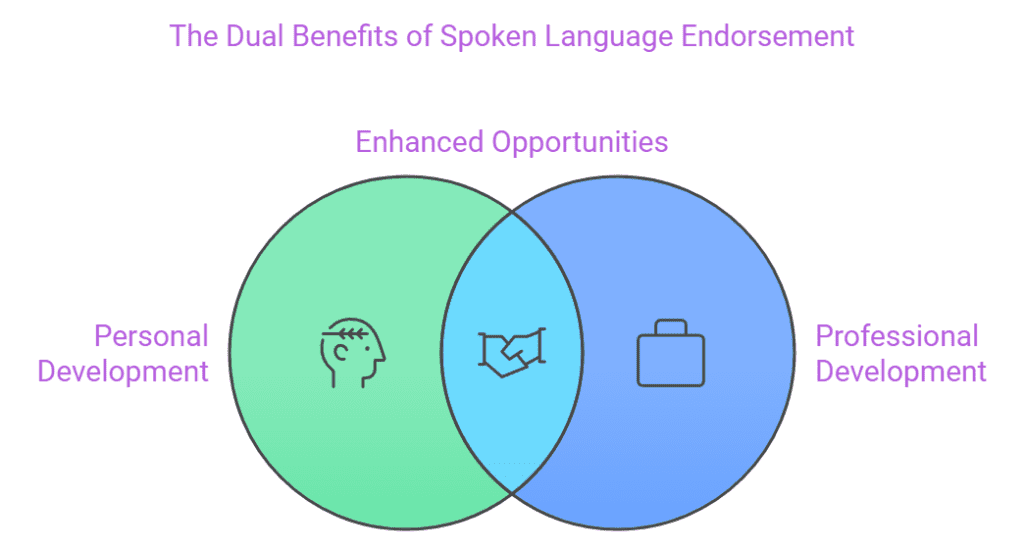The Spoken Language Endorsement (SLE) in the UK GCSE English Language qualification assesses students’ oral communication skills. Although it doesn’t contribute to the overall GCSE grade, it holds significant value and is reported alongside English Language results. This endorsement recognises students’ ability to express ideas clearly and engage with an audience, helping them build essential skills for further education and real-world scenarios.
If you want to know more about the spoken language endorsement, you are in the right place. In this guide, we’ll cover everything students and parents need to know about the Spoken Language Endorsement, from assessment formats to preparation tips. So, let’s begin!
Assessment Format and Requirements
The Spoken Language Endorsement offers a range of presentation formats to accommodate different strengths and interests. Students have the freedom to choose from various presentation styles, such as talks, debates, or dialogues, allowing them to explore topics they’re passionate about or to hone in on skills they want to develop.
- Presentation Types: Students can opt for an individual talk where they deliver a speech on a specific topic, a debate with another student to demonstrate argumentation skills, or a dialogue where they interact with a teacher or fellow student. The format aims to showcase not only their speaking ability but also their listening and response skills in interactive settings.
- Planning and Preparation: Students should carefully plan their presentations, considering both the content and the audience. Each presentation has a duration limit, usually between 3-5 minutes, giving students ample time to explore their topic without overloading information.
- Use of Aids: Students may use prompts like notes, cue cards, or visual aids like PowerPoint to support their presentation. While these can be helpful, it’s crucial that the aids don’t dominate the presentation but instead serve as tools to guide their speech and enhance audience engagement.
Preparing for the SLE involves practising clarity, pacing, and topic organisation, as well as finding ways to make the material engaging and accessible to listeners.

Assessment Criteria
The Spoken Language Endorsement bases on specific criteria that determine if a student achieves Pass, Merit, or Distinction. These grades reflect the quality of their oral communication skills, focusing on several core areas:
- Pass: To achieve a Pass, students need to show clear expression of ideas, with a basic structure and some ability to engage the audience. A Pass reflects adequate communication skills, where the student demonstrates reasonable fluency and coherence.
- Merit: For a Merit, students must go beyond clear expression and show well-organised structure, with stronger engagement techniques. At this level, students must engage the audience by adapting their presentation style to keep listeners interested. Additionally, responses to audience questions or feedback should be thoughtful and considered.
- Distinction: Achieving a Distinction requires exceptional clarity, confidence, and structure. Students must fully engage with the audience, displaying flexibility in responding to questions and feedback. At this level, the presentation should flow seamlessly, and the student’s ability to articulate ideas should feel natural and persuasive.
Each level focuses on elements like clarity, structure, and engagement, making preparation and practice crucial for students aiming for the higher endorsements.
Recording and Submission Guidelines
For the Spoken Language Endorsement, schools must record presentations to accurately assess and verify students’ performances. Schools are responsible for creating a high-quality audio-visual recording of each student’s presentation, meeting specific technical requirements set by the examining bodies. This recording allows both internal and external assessors to review and monitor the performance for standardisation.
- Technical Requirements: Presentations should be recorded with clear audio and visual quality so that the student’s speech and expressions are easily discernible. Schools often use camcorders or smartphones, ensuring that the camera is stable and has right position to capture the student’s face, gestures, and body language. The most commonly accepted file formats are MP4 or MOV, as they are compatible with most playback devices.
- Submission Procedures: Schools typically submit completed recordings to exam boards on DVDs or USB drives.To keep the files organised, each recording should follow a specific naming convention that includes the student’s full name, candidate number, and the presentation title or topic. This standardised format makes it easier for exam boards to process and locate recordings as needed. Schools may also use secure online platforms for submission, depending on the exam board’s requirements.
Internal and External Monitoring
To maintain fairness and consistency, the Spoken Language Endorsement includes both internal standardisation and external monitoring processes.
- Internal Standardisation: Within each school, there is a process to ensure consistent grading across all students. This involves multiple assessors meeting to review sample recordings and agreeing on standards for Pass, Merit, and Distinction grades. By setting clear benchmarks and discussing any borderline cases, assessors can apply a uniform standard to all presentations, ensuring fair assessment for each student.
- External Monitoring: Awarding bodies require schools to submit a sample of recordings for external monitoring. This process verifies that the school’s grading aligns with national standards. The sample size and selection process vary by exam board but typically involve a mix of Pass, Merit, and Distinction performances. External moderators review these recordings to confirm that the internal assessment is accurate and consistent with guidelines. If moderators find any discrepancies, they provide feedback to help schools adjust their grading approach.
Special Considerations and Candidate Absence
Special considerations are in place for students who might miss their Spoken Language Endorsement assessment due to unavoidable circumstances or have specific needs that require accommodations. These provisions ensure fairness and inclusivity so that all students have an equal opportunity to complete the endorsement.
- Candidates with Special Needs: Schools make adjustments to accommodate students with special needs. These adjustments could include extended preparation time, the use of additional support tools, or allowing presentations in a smaller, quieter setting if it helps alleviate stress. Schools work with exam boards to ensure these accommodations follow official guidelines, and they document any modifications to maintain assessment integrity.
- Candidate Absence: For students who miss their initial assessment due to illness or other valid reasons, schools may offer a rescheduled assessment if time permits. However, if it’s not possible to reschedule, the endorsement may be recorded as “uncompleted,” meaning the student would not receive a Pass, Merit, or Distinction. While this doesn’t impact the main GCSE English Language grade, students without a Spoken Language Endorsement mark may miss out on opportunities where strong communication skills are considered.

Re-use of Grades and Carrying Forward
For students who are retaking GCSE English Language, there is an option to carry forward the Spoken Language Endorsement grade from a previous attempt, provided it meets the requirements of the exam board.
- Conditions for Carrying Forward: Students who achieved a Pass, Merit, or Distinction on their Spoken Language Endorsement in a prior sitting can reuse this grade when retaking the English Language exam. This option is beneficial for students who want to improve their written grade without the need to redo the Spoken Language component. However, they must inform their school or exam centre in advance, so the exam board is aware of their intention to carry forward the endorsement grade.
- Implications: Carrying forward an endorsement grade allows students to focus on the written part of the GCSE retake, reducing their overall workload and enabling them to concentrate on areas where they want to improve. It ensures that prior achievements in oral communication are recognised and carried over to their final grade report.
Key Deadlines and Administrative Requirements
For the Spoken Language Endorsement (SLE), it’s essential for schools and exam centres to adhere to specific deadlines set by the exam boards to ensure a smooth assessment process. These deadlines are in place for student entries, recording submissions, grade reporting, and sample selection.
- Entry Deadlines: Schools must enter students for the Spoken Language Endorsement by the same deadline as the main GCSE English Language qualification. This usually falls between mid-February and late March for summer exams.
- Submission of Grades: Grades for Pass, Merit, and Distinction need to be submitted by the end of May. Schools record these internally but must report them to the exam board by the specified deadline.
- Submission of Recordings: Schools must submit recordings of student presentations as a sample for moderation. The exam board specifies the sample size and selection process, and schools generally submit samples by mid-June. Recordings should meet technical requirements, with clear audio and visual quality, and follow the exam board’s naming conventions.
- Documentation: In addition to recordings, Schools must complete and submit a declaration form to verify that they assessed all students according to the guidelines. The board may also request a list of all students and their grades for verification.
AQA Specific Guidelines
The AQA (Assessment and Qualifications Alliance) has specific guidelines for administering the Spoken Language Endorsement, aimed at ensuring consistency, fairness, and accuracy across assessments.
- AQA Assessment Criteria: AQA follows the national criteria for Pass, Merit, and Distinction, focusing on clarity, audience engagement, response to questions, and structure. AQA assessors use these criteria consistently to ensure that students meet the national standard, and teachers are provided with detailed assessment rubrics to guide their marking.
- Submission Procedures for Recordings and Samples: AQA requires schools to submit a sample of recordings for external moderation. The exact number depends on the school’s total entries, typically including at least one recording from each performance level (Pass, Merit, and Distinction). Recordings can be submitted on USB drives or DVDs, but they must meet AQA’s technical standards, with clear audio and video.
- Documentation and Support: AQA requires schools to submit specific documentation, including a Declaration of Assessment form that confirms all eligible students have been assessed. AQA also provides guidance on organising and labelling recordings correctly to avoid administrative errors. For schools needing additional support, AQA offers resources such as online tutorials, sample assessments, and access to a dedicated subject adviser.
- Handling Recordings and Feedback: Once recordings are submitted, AQA moderators review the sample to ensure that grades align with national standards. Schools receive feedback on their assessments, highlighting any necessary adjustments or affirming the accuracy of their grading.
AQA’s streamlined processes and clear guidelines aim to make the Spoken Language Endorsement accessible and manageable for both teachers and students. For candidates needing additional support, online tutoring can be a valuable resource, providing targeted practice and guidance that aligns with AQA’s specific requirements and criteria, helping students feel confident in their presentation skills.

OCR Specific Guidelines
The OCR (Oxford, Cambridge and RSA) exam board has its own set of guidelines for the Spoken Language Endorsement, ensuring that students and schools are clear on how to meet the requirements for this component.
- Types of Presentations and Submission Format: OCR allows a range of presentation formats, including individual talks, group presentations, and dialogues. OCR is flexible with the types of presentations students choose, encouraging them to select topics they’re passionate about to improve engagement and confidence. For submission, OCR requires clear and high-quality audio-visual recordings of each student’s performance. USB drives or DVDs are commonly used for submission, with clear naming conventions that include the student’s full name, candidate number, and presentation title.
- Internal Standardisation and Monitoring: OCR emphasises internal standardisation within schools to maintain consistency, requiring assessors to meet and discuss grading criteria. This approach ensures fair awarding of Pass, Merit, and Distinction levels across the board. OCR provides standardisation materials and sample responses to help centres align with expected standards. Additionally, OCR requires a sample of recordings from each school, selected across various performance levels, which are then externally moderated to verify consistent application of assessment criteria.
For detailed guidance on OCR’s requirements for the Spoken Language Endorsement, visit the OCR official page on Spoken Language Endorsement.
Pearson Specific Guidelines
Pearson Edexcel has specific protocols for the Spoken Language Endorsement, with particular focus on recording and submission procedures, as well as clear policies for reusing grades.
- Recording and Submission Guidelines: Pearson requires that each presentation be recorded with high-quality audio and visuals, capturing the student’s facial expressions, gestures, and voice clarity. Pearson accepts both USB drives and DVDs for submission, with file formats typically limited to MP4 or MOV. The submitted recordings should be organised with clear labels, ensuring ease of access for assessors. Pearson also emphasises that all recordings submitted for moderation should meet the technical specifications provided in their guidelines.
- Re-using Grades and Carrying Forward: Pearson allows students to carry forward their Spoken Language Endorsement grade if they’re retaking the GCSE English Language exam, provided they achieved Pass, Merit, or Distinction in their previous attempt. This option saves time for students by allowing them to focus solely on improving their written exam performance. However, students must notify their exam centre if they wish to carry forward their previous grade, as the exam board requires confirmation.
For further information on Pearson’s Spoken Language Endorsement
Conclusion
As you can see, the Spoken Language Endorsement offers students a valuable chance to enhance their communication skills. These skills are essential in both academic and real-life contexts. Each exam board—AQA, OCR, and Pearson—has specific guidelines. However, all focus on clear expression, organisation, and audience engagement and you must note that. Also, if you think that you need additional help remember, online tutoring can help students improve their presentation abilities. Tutors provide personalised feedback, building students’ confidence and refining their skills. With targeted support, students can meet exam board criteria and succeed in this important assessment. We hope our detailed guide about spoken language endorsement was helpful for you. Good Luck!








